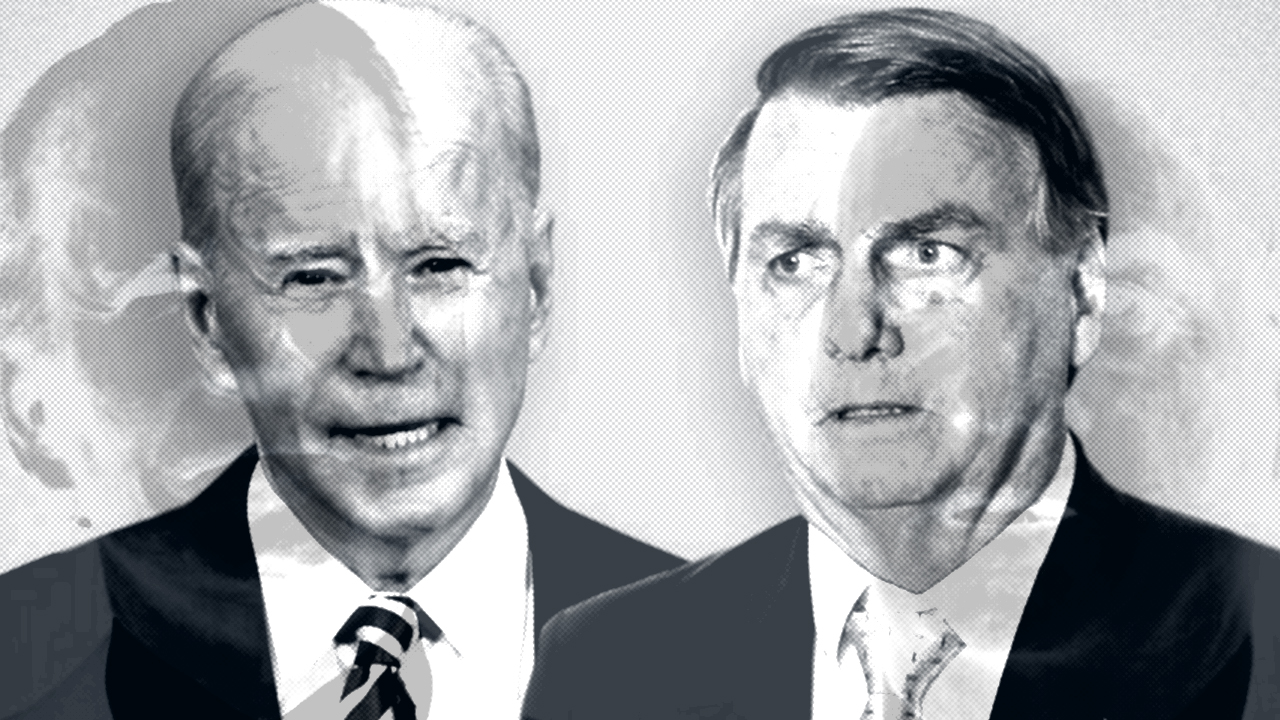Biden’s one-on-one meeting with Brazil’s beleaguered far-right president Bolsonaro is now the awkward centrepiece of a collapsing Summit of the Americas in Los Angeles.
Little more than a month after United States’ Government sources leaked details of CIA warnings to Bolsonaro and the Military dominated government he fronts about the sanctity of October’s election, US President Joe Biden holds his first ever meeting with Brazilian counterpart Jair Bolsonaro. It will take place during the Summit of the Americas, which runs from the 6th to the 10th of June, in Los Angeles, California.
With just four months until that election, the meeting follows cooling of language from U.S. officials, which has gone from explicit warnings to Bolsonaro and the Military to leave the democratic process alone, and insinuations of “foreign election meddling”, to insistences that the October vote will be “free and fair”, and a reiteration of U.S. faith in the strength of Brazil’s institutions. There has also been a succession of U.S. delegations to Brazil, one for “high level dialogue” with the Bolsonaro government, led by Undersecretary of State for Political Affairs Victoria Nuland, and another 70 strong party of business executives, headed by Assistant Secretary of Commerce Don Graves.
The White House said that the Biden-Bolsonaro meeting will include discussion of “food insecurity, climate change and pandemic recovery”.
But when asked if Biden would query Bolsonaro’s questioning of Brazil’s voting system, his top Latin America advisor, Juan Gonzalez, would only say that the U.S. has “confidence in Brazil’s electoral institutions which have proven robust.”
New U.S. Ambassador Elizabeth Bagley has praised ultraliberal Bolsonaro Economy Minister Paulo Guedes as a “moderate”, and sought to publicly separate dealings with him from the military-dominated regime as a whole. Bolsonaro’s double act with Guedes was key to why the neofascist candidate was so attractive to U.S. Government, Business and Banking four years ago. In international strategic terms, for the Biden government there is no contest – Bolsonaro wins, no matter how much distaste they may have for the candidate and his far-right aesthetics.
In comparison, with little or no effort by the U.S. government to meet with his campaign, Lula dispatched a special emissary to Washington, the former governor of Bahia State, Jacques Wagner, to reassure the Biden administration that an incoming – and seemingly inevitable – Lula presidency, posed no threat to U.S. interests. This however sits uncomfortably with Lula’s public criticisms of Biden, and the role of the U.S. in the prosecution which removed him from the 2018 race when he led by 20 points. The Wagner trip is rumoured to have not been particularly productive.
The question therefore remains what, in a range of possible outcomes, does the Biden administration actually prefer to come to pass in October, and what effect the Biden-Bolsonaro meeting may or may not have on those preferences. For example, beyond Brazil’s heightened integration with Southcom and a range of other strategic advantages his government has brought for the U.S., the Stars and Stripes saluting Bolsonaro government’s late pushes to privatise State controlled Petrobras and Eletrobras will be music to Washington ears.
The kicker for Democrats is that Bolsonaro is is Steve Bannon’s candidate, and was one of the last world leaders to acknowledge his ally Donald Trump’s electoral defeat, thus any contact whatsoever with Biden will be awkward at best, especially given his own attempt to pre-emptively allege election fraud in the coming election.
Yet Gonzalez told the news conference to preview the Summit of the Americas that “The issue of the Brazilian elections is really up for the Brazilians to decide,” appearing to dismiss ethical concerns about Biden’s meeting with someone who is actively threatening Brazil’s democratic institutions.
The special invitation to Bolsonaro is especially contradictory in this context, given that Nicaragua, Cuba and Venezuela have been arbitrarily excluded from the Summit on the basis of complaints about their democratic processes, leading to other Latin American leaders such as those of Honduras, Bolivia, Guatamala and Mexico, to declare their non-participation in solidarity.
Bolsonaro’s attendance was secured via an extraordinary visit by Biden’s advisor and special envoy, former senator Chris Dodd, who offered the one on one with Biden as an incentive, in an effort to save the conference from a widening threatened boycott, which included Mexican President Lopez Obrador.
The Summit of the Americas was first held in Miami in 1994, and this year in Los Angeles is the first time the United States has hosted since. Like the Organisation of American States which initiated the Summit, it is considered imperialist in nature, and distrusted by the Latin American left.
One of the most impactful was 2005 in Mar del Plata, Argentina, where the proposed Free Trade Area of all the Americas (FTAA) was defeated by a combined front of Brazil’s Lula, Venezuela’s Hugo Chavez, and Argentina’s Nestor Kirchner. That rejection later prompted former Ambassador Thomas Shannon Jr to describe the governments of Lula and Dilma as having disrupted US plans for the hemisphere.
At the 2009 Summit of the Americas, in Trinidad & Tobago, the late Venezuelan leader Hugo Chavez gave Barack Obama a copy of Eduardo Galeano’s “The Open Veins of Latin America: Five Centuries of the Pillage of a Continent.”
In 2018, only 17 of 35 heads of state attended in Peru, and the U.S. president wasn’t one of them, amid predictions that there was no future for the Summit at all.
[qpp]

